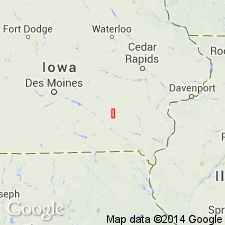
- Usage in publication:
-
- Croton Member
- Modifications:
-
- Revised
- AAPG geologic province:
-
- Iowa shelf
Summary:
St. Louis Formation in southeast IA divided [by McKay] into the following members (ascending): Croton, Verdi, and Waugh (newly named). The Croton was formerly referred to as the "lower" St. Louis by Van Tuyl (1922). In this report, is present mostly in the subsurface. Is between 40-70 ft thick and unconformably overlies the Warsaw Shale. Seen in east central IA on the Iowa shelf. Lower part is sandy, variably cherty dolomite and sandstone that grades west from western Mahaska Co into sandstones and bedded gypsum-anhydrite. Upper part is quartzose sandstone throughout area capped by a laminated, pelletal lime mudstone bed containing birdseye. Probably deposited in a shallow marine subtidal reworking of sand transported to area by a fluvial system. Fossils--brachiopods, bryozoans, trilobites, bivalves, solitary rugose and tabulate corals. Cross sections. Of Late Mississippian age.
Source: GNU records (USGS DDS-6; Denver GNULEX).
For more information, please contact Nancy Stamm, Geologic Names Committee Secretary.
Asterisk (*) indicates published by U.S. Geological Survey authors.
"No current usage" (†) implies that a name has been abandoned or has fallen into disuse. Former usage and, if known, replacement name given in parentheses ( ).
Slash (/) indicates name conflicts with nomenclatural guidelines (CSN, 1933; ACSN, 1961, 1970; NACSN, 1983, 2005, 2021). May be explained within brackets ([ ]).

